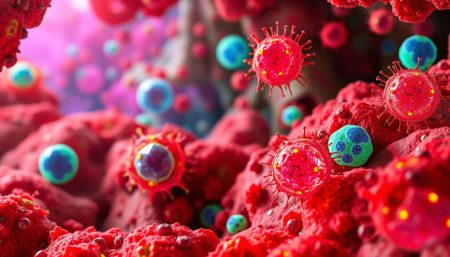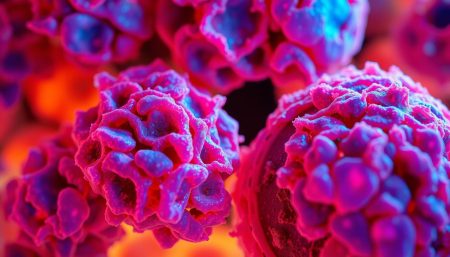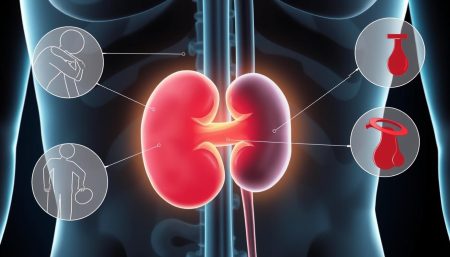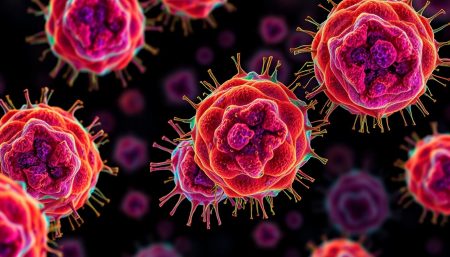Starting to understand colorectal cancer often means spotting early signs. The American Cancer Society says finding cancer early is key to better treatment. Knowing these signs can greatly improve health outcomes and even save lives.
The Centers for Disease Control and Prevention (CDC) has clear guidelines on cancer symptoms. These signs might seem small but are important to notice. Paying attention to your body can help you act fast if you see any warning signs.
Survivor stories are very powerful. They show how important it is to notice cancer symptoms early. These stories prove that quick medical action can make a huge difference in fighting this disease.
Key Takeaways
- The importance of early detection in improving survival rates for colorectal cancer patients.
- CDC guidelines serve as a crucial resource for understanding the warning signs of colorectal cancer.
- Recognizing the symptoms of colorectal cancer is a vital step toward timely diagnosis and treatment.
- Personal narratives from survivors underscore the life-saving impact of early cancer detection.
- Increased colorectal cancer awareness can lead to more widespread screening and preventive measures.
Understanding Colorectal Cancer and Its Prevalence
Colorectal cancer is a big health issue worldwide. The cancer prevalence rates grab the attention of health groups. The World Cancer Research Fund and the National Cancer Institute share important data. This helps us understand the scope and depth of this disease.
Recent colorectal cancer statistics show it’s the third most common cancer, excluding skin cancers. The risk factors for colorectal cancer are many. They include age, diet, lifestyle, and genetics.
| Country | Annual Incidence |
|---|---|
| United States | 104,610 new cases (2020) |
| United Kingdom | 42,900 new cases (annually) |
| Australia | 15,494 new cases (2020) |
Knowing these colorectal cancer statistics is key for prevention and treatment. Medical journals often look at how environment and genetics affect risk factors. This helps us understand cancer prevalence better.
- Age is a big risk factor, with more cases in people 50 and older.
- Eating a lot of red meat and processed foods raises the risk.
- Being active and having a healthy weight can lower the risk.
Being aware of colorectal cancer risk factors and prevalence is crucial. It helps reduce the disease’s global impact. This shows the need for both personal and group efforts in fighting cancer.
Colorectal Cancer Symptoms: What to Look For
Identifying early signs of colorectal cancer is key to early treatment. This section explores common symptoms. It helps you spot potential red flags early.
Recognizing Changes in Bowel Habits
Bowel movement changes are often the first sign of colorectal cancer. You might notice constipation, narrower stools, or persistent diarrhea. If these changes last more than a few days, see a doctor.
Identifying Types of Abdominal Discomfort
Persistent abdominal pain is a key early sign. Unlike normal stomach cramps, this pain doesn’t go away. It may get worse over time. Knowing if the pain is in one spot or all over can help you talk to your doctor.
Navigating Through Fatigue and Weakness
Excessive fatigue is another important symptom. It can be caused by many things, but if it’s with other symptoms like weight loss, it’s a concern. Especially if it doesn’t get better with rest.
| Symptom | Possible Causes Other Than Cancer | When to Consult a Doctor |
|---|---|---|
| Bowel Movement Changes | Diet changes, medication side effects | Persist for more than two weeks |
| Persistent Abdominal Pain | Ulcers, gastritis | Increases in intensity or frequency |
| Excessive Fatigue | Anemia, thyroid problems | Does not improve with rest |
Each symptom, alone or together, might need more tests. A quick response can lead to early diagnosis. This is crucial for effective treatment and better results.

Rectal Bleeding: A Red Flag for Colorectal Issues
Seeing rectal bleeding signs can be scary and is a big warning sign of colorectal cancer. If you notice blood in stool, you should see a doctor right away. Early detection and treatment are key, as experts like the Mayo Clinic say.
Rectal bleeding can look different. It might be light or dark, depending on where it comes from. This means doctors need to check carefully to find out why it’s happening.
- Check if the bleeding is accompanied by other symptoms like unexplained weight loss or severe fatigue.
- Notice the frequency and consistency of the bleeding.
- Be aware of any family history of gastrointestinal diseases, including colorectal cancer.
| Age Group | Incidence of Rectal Bleeding | Common Causes |
|---|---|---|
| 20-40 years | Less Common | Mostly hemorrhoids, anal fissures |
| 41-65 years | More Common | Increased risk of colorectal polyps or cancer |
| Above 65 years | Highly Common | Colorectal cancer, diverticular disease |
Studies show that catching colorectal cancer early can lead to better treatment and outcomes. So, it’s important to know rectal bleeding signs and blood in stool as warning signs of colorectal cancer. This helps doctors act fast.
Abdominal Cramps and Pain: Symptoms Not to Ignore
Feeling persistent abdominal cramps or chronic abdominal pain might seem like just normal stomach issues. But, these signs are key in spotting colorectal cancer symptomatology. Noticing these pains early can help find health problems, like colorectal cancer.
Guides from patient care groups stress the importance of knowing the type and length of abdominal pain. Mild, occasional pain is different from constant, severe pain. The latter might signal serious issues, like colorectal cancer.
Experts in pain management explain how to tell if pain is from colorectal issues or other stomach problems. Pain in the lower belly that lasts and comes with other signs like changes in bowel movements or bleeding needs a doctor’s check-up.
Studies show a link between long-term belly pain and colorectal cancer risk. If you have chronic pain and other symptoms like changes in stool or unexplained weight loss, see a doctor. They can check for colorectal cancer.
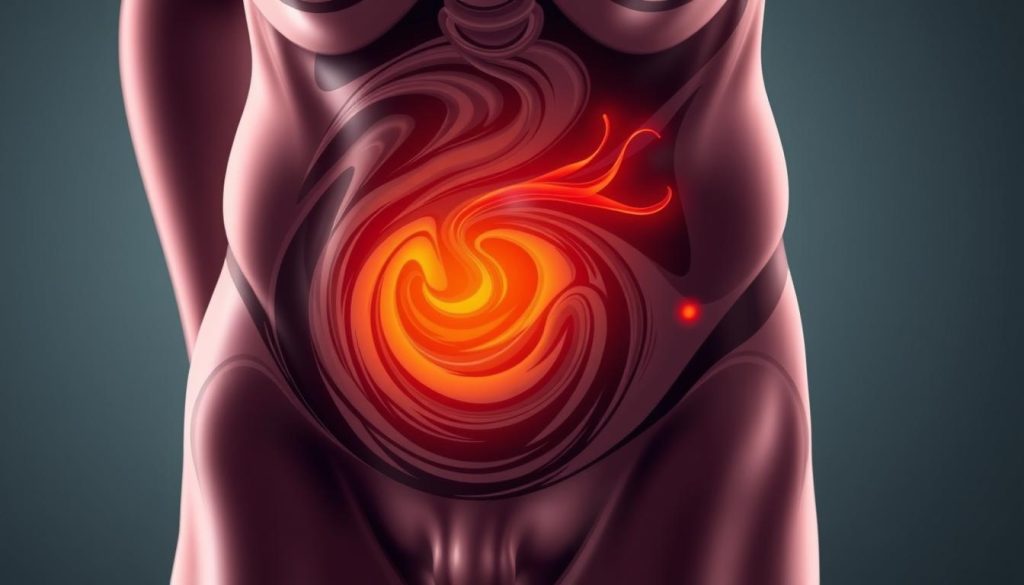
Knowing the importance of these symptoms helps people get medical help early. This can lead to catching colorectal cancer sooner. So, persistent abdominal cramps and chronic abdominal pain are important signs of colorectal cancer symptomatology.
Constipation and Diarrhea: Signs of Colorectal Distress
Understanding the switch between constipation and diarrhea is key to watching your gastrointestinal health. These symptoms are common but can also hint at colorectal cancer if they last too long.
Constipation and diarrhea mess up normal bowel movements, which are vital for a healthy gut. Constipation makes it hard to pass stools, putting pressure on the colon. Diarrhea, on the other hand, can cause dehydration and lose nutrients. If you have these symptoms often, it’s time to see a doctor.
- Constipation might mean there’s a blockage or nerve problem in the colon.
- Diarrhea could show irritation or infection in your gut.
| Condition | Symptoms | Potential Indicator |
|---|---|---|
| Constipation | Hard, infrequent stools | Possible mass obstructing the colon |
| Diarrhea | Frequent, watery stools | Inflammation or infectious agents |
If you often have constipation or diarrhea without a clear reason, it’s time to check it out. These symptoms might not just be about IBS but could also be signs of colorectal cancer. Catching problems early is crucial for better health.
If you notice these symptoms with other signs like unexplained weight loss or blood in your stool, get help fast. People over 50 or with a family history of colorectal cancer should get screened regularly. This helps catch problems early and keeps your gut healthy.
The Impact of Fatigue and Weakness on Daily Life
Fatigue and weakness can greatly affect daily life, especially for those with colorectal cancer. These symptoms can change how we feel and think. They can make everyday tasks harder and affect our mental health.
Studies and patient stories show that cancer fatigue is different from regular tiredness. It doesn’t go away with rest. This makes daily life and quality of life very challenging.
Patients often describe this kind of fatigue as feeling ‘drained of energy’, which prevents them from performing even simple tasks that once felt automatic and required minimal effort.
- Emotional toll: Feeling weak can lead to frustration, affecting our mental health and emotional well-being.
- Social isolation: Not being able to do social activities can make us feel isolated and disconnected from others.
- Professional impact: Fatigue and weakness can make us less productive at work. This affects our job and sense of self.
| Aspect of Life | Impact of Fatigue & Weakness |
|---|---|
| Physical Activities | Significant reduction in ability to perform daily tasks like grocery shopping or household chores. |
| Mental Focus | Decreased concentration and memory, making it hard to focus on tasks or remember important information. |
| Social Engagement | Lower participation in social activities; increased feelings of isolation. |
| Emotional Health | Increased risk of depression and anxiety due to ongoing physical limitations and social withdrawal. |

Knowing how colorectal cancer effects our lives is key. It shows we need therapies that help with physical, mental, and social challenges. Doctors and caregivers must offer care that improves patients’ lives during treatment.
Unintended Weight Loss: Understanding the Connection to Colorectal Cancer
Unintended weight loss is a key symptom of colorectal cancer. It’s a colorectal cancer warning sign that needs quick attention. This symptom is not just a concern but a serious indicator.
Weight loss in colorectal cancer can happen for several reasons. It might be because of less appetite or the tumor’s high metabolic needs. Doctors say it’s crucial to spot these weight changes early. They often happen before symptoms like pain or bleeding are noticed.
Nutritional evaluations are pivotal in establishing the connection between rapid weight loss and potential underlying health issues, including colorectal cancer.
- Decreased calorie intake due to altered bowel habits
- Increased metabolic rate due to cancer’s systemic effects
Studies show that unintended weight loss can be the first sign of colorectal cancer in many patients. If you lose weight without a clear reason, it’s important to get checked for cancer.
Experts in oncology nutrition explain how cancer can lead to weight loss. They say the tumor’s growth uses a lot of energy. This can change how the body uses and stores nutrients, causing weight loss.
Linking unexplained weight changes to colorectal cancer helps us understand and fight it better. If you suddenly lose weight without reason, see a doctor. They can check for colorectal cancer.
Recognizing and acting on this colorectal cancer warning sign can greatly improve your chances of recovery. Early action and the right treatment can make a big difference.
Iron Deficiency Anemia Linked to Colorectal Cancer
Iron deficiency anemia is a common issue that might point to serious health problems like occult bleeding. This bleeding is hidden and can be linked to colorectal cancer. It’s important to watch for signs and seek medical help quickly.
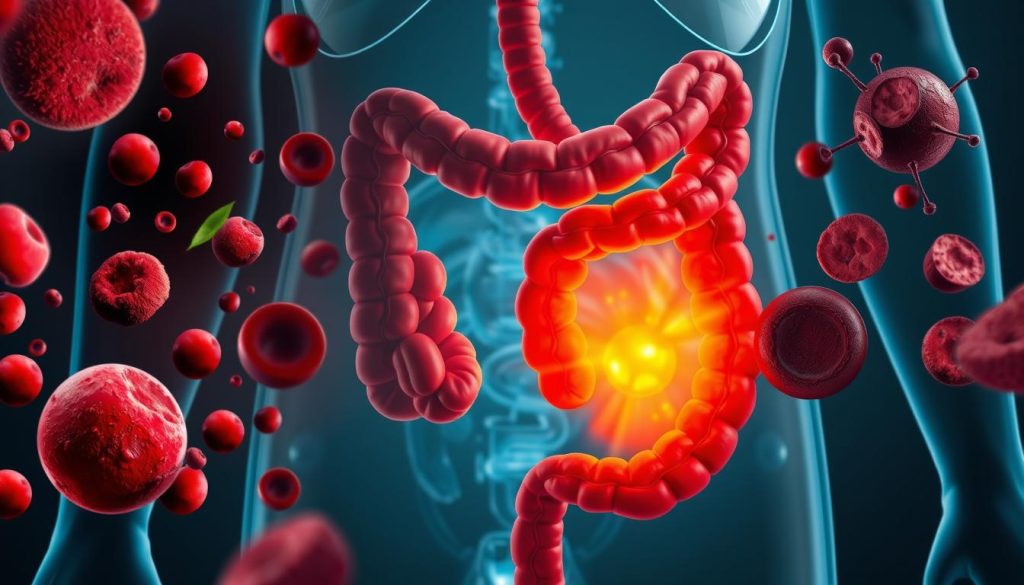
Anemia is a key factor in spotting and treating colorectal cancer. Studies show that ongoing iron deficiency anemia could mean colorectal cancer is present. Symptoms like changes in bowel habits or unexplained weight loss are also important to watch for. Knowing the cause of anemia is crucial for early treatment and diagnosis.
| Condition | Significance in Colorectal Cancer | Common Symptoms |
|---|---|---|
| Iron Deficiency Anemia | May indicate occult bleeding and risk of colorectal cancer | Fatigue, paleness, and weakness |
| Occult Bleeding | Direct indicator of possible tumors or polyps in the colon | Visible blood in stool, abdominal pain |
To learn more about symptoms and causes, especially in women, it’s good to read about early warning signs of colorectal cancer. Spotting and treating symptoms early can greatly improve health outcomes.
Understanding the link between iron deficiency anemia and colorectal cancer is key for early detection. It also encourages important talks about screening and prevention. Both patients and doctors should focus on being aware and acting fast against these health issues.
The Role of Genetic Factors in Colorectal Cancer
Looking into the genetics of colorectal cancer shows a strong connection to genetic risk factors. This knowledge helps spot people at risk through family history. It also highlights the value of genetic counseling.
Familial Risks and Genetic Predispositions
Some inherited syndromes, like Lynch syndrome and familial adenomatous polyposis, raise the risk of colorectal cancer a lot. These conditions are passed down, making family history a key part of prevention.
How Genetic Counseling Can Help
Genetic counseling benefits by giving a personalized risk check based on your and your family’s genes. This helps people make smart health choices. It can lead to early screenings and prevention.
| Condition | Increased Risk Factor | Common Age of Onset |
|---|---|---|
| Lynch Syndrome | Up to 80% | 45 years |
| Familial Adenomatous Polyposis | Nearly 100% | 39 years |
| Hereditary Nonpolyposis Colorectal Cancer | 70% | 50 years |
The Warning Signs of Bowel Obstruction
It’s important to know the signs of bowel obstruction, especially if it could mean colorectal cancer complications. This blockage can happen in the small intestine or colon. Symptoms include severe stomach pain, bloating, and trouble passing gas or stools. These symptoms can be uncomfortable and even dangerous if not treated quickly.
Identifying symptoms early is key in managing intestinal blockage effectively and minimizing the risk of severe complications such as necrosis or sepsis. Emergency medical attention is required as soon as these indicators are noticed:
- Abdominal distension or visible swelling
- Intense cramps or abdominal pain
- Nausea and vomiting
- Constipation or inability to have a bowel movement
- Failure to pass gas
It’s crucial to recognize these signs not only to address immediate discomfort but also as potential indicators of deeper issues, such as colorectal cancer complications. In some cases, a tumor within the colon can lead to bowel obstruction, making it imperative to consider these symptoms seriously.
| Symptom | Possible Cause | Risk Factor |
|---|---|---|
| Severe abdominal pain | Pressure build-up from blockage | Immediate medical checkup required |
| Bloating and swelling | Fluid and gas accumulation | Potential tissue damage |
| Constipation | Intestinal blockage | Long-term health complications |
In conclusion, early detection and treatment of bowel obstruction symptoms are vital. Regular medical examinations and being alert to the changes in one’s bodily functions can be life-saving, especially where colorectal cancer complications are concerned. Monitoring these symptoms closely, along with professional guidance, helps manage health effectively and might prevent severe outcomes of intestinal blockage.
Detecting Colorectal Cancer: Screening and Diagnosis
The battle against colorectal cancer starts with good screening and accurate diagnosis. Using the latest tools can help find cancer early. This is key for better treatment results.
The Importance of Regular Screenings
Screening for colorectal cancer is crucial for catching it early, especially for those over 45. It can find cancer before symptoms show up, making treatment easier. These tests are a must for adults at risk, even if they don’t have symptoms.
Advanced Diagnostic Techniques
New ways to find colorectal cancer are making a big difference. Tools like virtual colonoscopy and DNA stool tests are leading the way. They are less invasive and more accurate than old methods.
| Screening Method | Description | Benefits |
|---|---|---|
| Traditional Colonoscopy | A visual examination of the colon using a long, flexible camera. | Comprehensive; allows for immediate biopsy or polyp removal. |
| Virtual Colonoscopy | Uses CT scans to produce images of the colon and rectum without sedation. | Less invasive, does not require anesthesia, and has shorter recovery time. |
| DNA Stool Test | Tests stool for DNA markers that indicate cancer cells. | Non-invasive and can be done at home; does not require diet or medication restrictions. |
When to Consult a Doctor: Colorectal Cancer Symptoms
Getting a timely diagnosis starts with seeking doctor advice for colorectal cancer symptoms. Knowing when normal discomforts turn into cancer signs is key. We’ll talk about when to see a doctor and what symptoms to watch for.
Some colorectal symptoms need quick doctor visits. These include ongoing bowel changes, unexplained weight loss, and constant belly pain. For more on early signs, check out this resource.
- Persistent changes in bowel habits (constipation or diarrhea)
- Blood in the stool or rectal bleeding
- Unexplained fatigue or weakness
- Abdominal pain or discomfort that doesn’t go away
- Unintended weight loss
One symptom alone might not mean cancer, but seeing a doctor is wise if you have one or more. Colorectal cancer concerns can seem like minor issues, leading people to delay seeking doctor advice. But catching it early is crucial for fighting cancer.
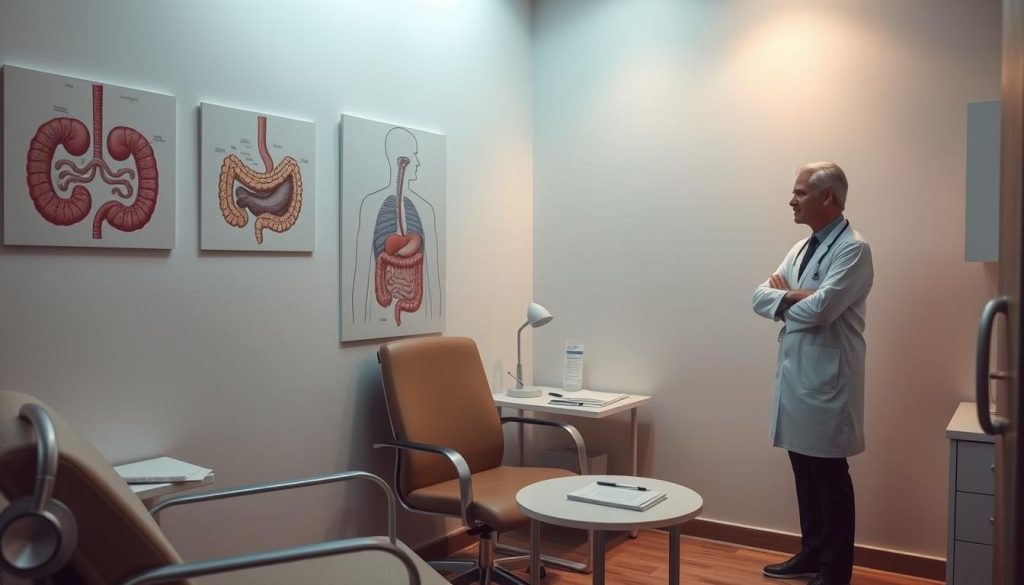
People with a family history of colorectal cancer or conditions like IBD should see a doctor fast if symptoms show up.
If you or someone you know is at risk or shows symptoms, contacting a reputable healthcare provider is vital. They can do tests and screenings that could save lives.
Remember, a healthy future is more than just treating symptoms. It’s about being proactive and seeking doctor advice when you notice something off. Your health is important. Listen to your body and act on its signals.
Navigating Treatment Options for Colorectal Cancer
Looking into effective treatments is key for those with colorectal cancer. Colorectal cancer treatments mix different methods based on the patient and their disease. We’ll dive into surgical intervention, chemotherapy, and radiation therapy. We’ll also explore targeted therapies and immunotherapy innovations.
Surgery and Its Role in Treatment
Surgery is a mainstay in treating colorectal cancer, especially for localized tumors. Removing the tumor and nearby tissues can greatly improve health and sometimes cure it. The surgery type and extent vary based on the tumor’s location and stage.
Chemotherapy and Radiation: What to Expect
Chemotherapy and radiation therapy are crucial in colorectal cancer treatment. Chemotherapy uses drugs to kill cancer cells, often after surgery to get rid of any left-over disease. Radiation therapy uses high-energy rays to shrink tumors and kill cancer cells, helping control tumor growth and manage symptoms.
Targeted Therapy and Immunotherapy Advancements
Recent years have seen big steps forward in targeted therapies and immunotherapy innovations for colorectal cancer. Targeted therapies target specific genetic mutations in cancer cells. Immunotherapy boosts the immune system’s fight against cancer. These therapies aim for better results and fewer side effects than traditional treatments.
For more on diagnostics and treatments, check out the Mayo Clinic. They offer detailed insights. Learn more about colorectal cancer diagnosis and treatment options.
| Treatment Type | Common Usage | Advancements |
|---|---|---|
| Surgical Intervention | Removal of localized tumors | Minimally invasive techniques |
| Chemotherapy | Post-surgical eradication of remaining cancer cells | Integration of newer, less toxic chemicals |
| Radiation Therapy | Pre-surgical tumor shrinkage | Enhanced precision with image-guided radiation |
| Targeted Therapy | For cancers with specific genetic profiles | Development of new small-molecule drugs |
| Immunotherapy | Advancing stages or recurrent cancers | New checkpoint inhibitors and vaccines |
Conclusion
We’ve looked into colorectal cancer and found amazing strength in those who’ve beaten it. Survivor groups talk about the importance of catching cancer early and getting treatment fast. They also stress the need to keep hope alive.
Healthcare groups keep pushing for more awareness and action. Knowing the signs and how to get screened can lead to early detection. This can make a big difference in treatment success.
The stories of cancer survivors are truly inspiring. They show us that quick action and staying strong are key. Let’s keep working to educate and support everyone, so they can fight cancer too.
FAQ
Q: What are the early warning signs of colorectal cancer I should watch for?
A: Look out for changes in your bowel habits, like diarrhea or constipation that lasts. Also, watch for rectal bleeding or blood in your stool. Other signs include persistent abdominal pain, fatigue, weakness, and unintended weight loss. If you notice these, see a doctor right away.
Q: How crucial is early detection in improving colorectal cancer outcomes?
A: Early detection is key to beating colorectal cancer. The American Cancer Society says finding cancer early greatly increases treatment success. This is because cancer is easier to treat when it’s still small.
Q: What risk factors are associated with colorectal cancer?
A: Several things can raise your risk of getting colorectal cancer. These include getting older, having a family history of it, or certain genetic conditions. Lifestyle factors like diet, not exercising, being overweight, drinking too much alcohol, and smoking also play a role.
Q: Can changes in bowel habits be a sign of colorectal cancer?
A: Yes, changes in your bowel habits, like diarrhea or constipation, can be a sign of colorectal cancer. Don’t ignore these changes.
Q: How can bowel obstruction be a symptom of colorectal cancer?
A: A bowel obstruction can happen if a tumor blocks the intestine. Symptoms include severe bloating, abdominal pain, constipation, and vomiting. Seeing a doctor quickly is important because these symptoms can be serious.
Q: What role does genetic predisposition play in colorectal cancer?
A: Genetics can greatly increase your risk of colorectal cancer. Conditions like Lynch syndrome and familial adenomatous polyposis are examples. If your family has a history of it, you might need to start screening early.
Q: How is unintended weight loss connected to colorectal cancer?
A: Unintended weight loss can be a sign of colorectal cancer. The disease can make it hard for your body to use nutrients. This weight loss might be due to a tumor blocking your intestine, affecting your appetite, or changing how your body uses nutrients.
Q: What are the indications of iron deficiency anemia linked to colorectal cancer?
A: Iron deficiency anemia can be a sign of hidden bleeding, which might not show in your stool. Symptoms include fatigue, pale skin, shortness of breath, and weakness. Your doctor might test for anemia and suggest more tests if they think of colorectal cancer.
Q: When should I begin regular screenings for colorectal cancer?
A: You should start regular screenings for colorectal cancer at age 45, according to health guidelines. If you have a higher risk, you might need to start earlier. Your doctor can help decide the best time for you.
Q: What are the next steps if I notice symptoms of colorectal cancer?
A: If you notice symptoms like persistent pain, rectal bleeding, or changes in your bowel habits, see a doctor right away. A colonoscopy, imaging, and lab tests might be needed to diagnose and plan treatment.
Q: What should I expect if I am diagnosed with colorectal cancer?
A: Treatment for colorectal cancer depends on the cancer’s stage and location. It might include surgery, chemotherapy, radiation, or newer treatments like targeted therapy and immunotherapy. Your medical team will explain your options and what to expect during treatment.












